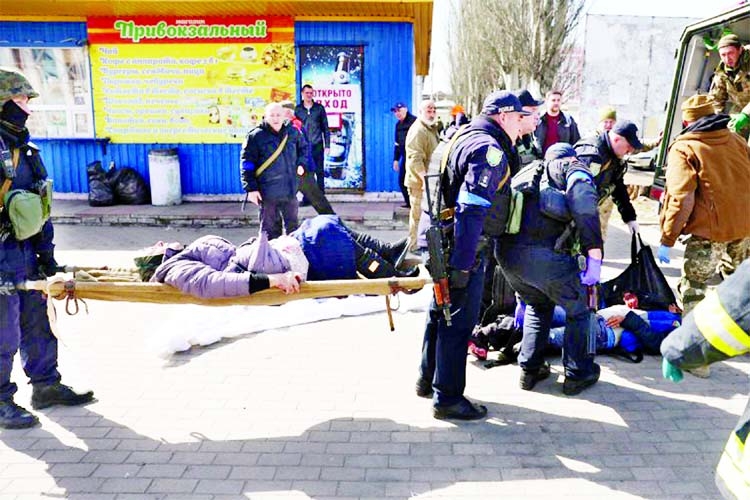
News Desk :
Ukraine said as many as 50 people, including five children, were killed and many more were wounded and lost limbs in a rocket strike at a railway station packed with civilians fleeing the threat of a major Russian offensive in the country’s east.
As regional authorities scrambled to rush civilians out of harm’s way, a group of European Union leaders meanwhile visited Kyiv to offer President Volodymyr Zelensky support and assure him there will be a path to EU membership for Ukraine, reports Reuters.
Zelensky called the strike on the station in Kramatorsk in the eastern region of Donetsk region a deliberate attack on civilians.
Regional governor Pavlo Kyrylenko said the death toll rose to 50 from an earlier reported 39 as some of the several dozen wounded had died after being taken to hospital or medical centres.
He said the station was hit by a Tochka U short-range ballistic missile that contained cluster munitions, which explode in mid-air, spraying small lethal bomblets over a wider area.
“They wanted to sow panic and fear, they wanted to take as many civilians as possible,” he said.
Reuters was unable to verify what happened in Kramatorsk.
The use of cluster munitions is banned under a 2008 convention. Russia has not signed the convention but has previously denied using such munitions in Ukraine.
The Russian defence ministry was quoted by RIA news agency as saying the missiles said to have struck
the station were used only by Ukraine’s military and that Russia’s armed forces had no targets assigned in Kramatorsk on Friday.
Zelensky said no Ukrainian troops were at the station. “Russian forces (fired) on an ordinary train station, on ordinary people, there were no soldiers there,” he told Finland’s parliament in a video address.
Kramatorsk Mayor Oleksander Honcharenko estimated that about 4,000 people were at the station at the time of the attack.
“Some people have lost a leg, others an arm. They are now receiving medical assistance. The hospitals are carrying out about 40 operations simultaneously,” the mayor said in an online briefing.
The White House decried the “horrific and devastating images” of the station attack.
EU foreign policy chief Josep Borrell, in Kyiv with the head of the EU executive Ursula von der Leyen, also condemned the strike.
“This is yet another attempt to close escape routes for those fleeing this unjustified war,” he said on Twitter.
Ukrainian officials say Russia is regrouping forces after withdrawing from the capital Kyiv’s outskirts, for a new thrust to try to gain full control of the eastern regions of Donetsk and Luhansk that have been partly held by Moscow-backed separatists since 2014.
In recent days, regional officials have urged civilians to flee eastern areas ahead of the expected onslaught.
Moscow has denied targeting civilians since invading Ukraine on Feb 24 in what it calls a “special military operation” to demilitarise and “denazify” its neighbour. Ukraine and Western supporters call that a pretext for an unprovoked invasion.
Russian forces have failed to take any major cities so far, confronted by unexpectedly strong Ukrainian resistance and dogged by what Western intelligence officials say have been logistical, supply and morale problems.
The Kremlin, though, said on Friday its “special operation” could end in the “foreseeable future” with its aims being achieved with work was being carried out by both the Russian military and Russian peace negotiators.
Russia’s invasion has displaced a quarter of the population, killed or injured thousands, laid cities to waste and prompted Western and other nations to inflict punishing sanctions and isolate Moscow diplomatically.
Kyiv has called on its allies for deliveries of more, heavier weapons needed to respond and on Thursday secured a new commitment from the NATO alliance to supply a wide range of weapons.
Ukraine’s military general staff said on Friday that Russian troops were focused on capturing the besieged southeastern port of Mariupol, fighting near the eastern city of Izyum and breakthroughs by Ukrainian forces near Donetsk.
Residents of areas north of Kyiv recaptured from Russian forces were still coming to terms with the month-long occupation.
In Yahidne, a village north of the capital, residents recounted how more than 300 people were trapped for weeks by Russian occupiers in a school basement, with names of those who did not survive the harsh conditions or were killed by soldiers scrawled on the wall.
Reuters was not able to verify independently the villagers’ accounts. Reporters saw one freshly dug grave in a field by the village and two bodies wrapped in white plastic sheets.
After civilian deaths in the town of Bucha were widely condemned by Western nations as war crimes, Zelensky said the situation in Borodyanka – another town northwest of Kyiv – was “significantly more dreadful”.
He offered no further detail or evidence that Russia was responsible for civilian deaths in the town.
Ukraine’s prosecutor general, Iryna Venediktova, said that in the Kyiv region, which includes Borodyanka and Bucha, authorities had found 650 bodies, 40 of them children.
Russia says images of bodies in Bucha were staged to justify more sanctions and derail peace negotiations.
The West has imposed more sanctions on Russia since the images surfaced, with Washington sanctioning top Russian lenders and President Vladimir Putin’s daughters, a move echoed by Britain on Friday, while the EU banned nearly 20 billion euros worth of trade, including a ban on Russian coal.
Zelensky has urged Brussels to do more to punish Russia, including banning Russian oil and gas. Borrell said a potential oil ban would be discussed on Monday in Brussels, but called oil sanctions “a big elephant in the room” given concerns over its impact on the European economy and its consumers.

